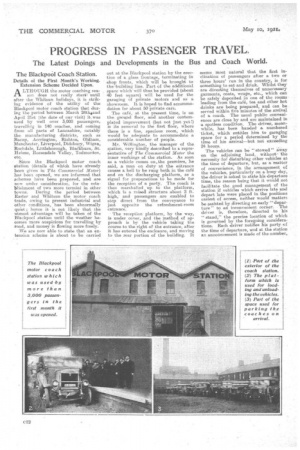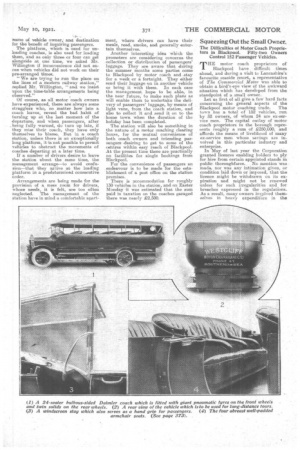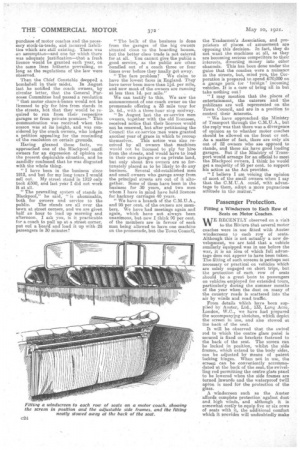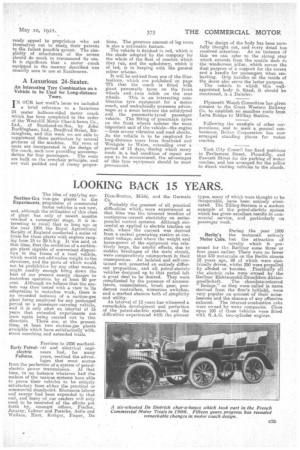PROGRESS IN PASSENGER TRAVEL,
Page 18

Page 19

Page 20

Page 21

If you've noticed an error in this article please click here to report it so we can fix it.
The Latest Doings and Developments in the Bus and Coach World.
The Blackpool Coach Station.
Details of the First Month's Working. Extension Scheme Decided Upon.
ALTHO UGH the motor coaching season does does not really start until after the Whitsun holidays, it is striking evidence; of the utility of the Blackpool motor coach station that during the period between March 24th1and April 21at (the date of our visit) it.wa.s used by well over 3,000 passengers, travelling in 140 coaches, and coming from all parts of Lancashire, notably the manufacturing districts, such as 33acup, Accrington, Rishton, Oldham, Manchester, Liverpool, Didsbury, Wigan, Rochdale, Littleborough, BlaCkburn, St.. Helens, Rossendale Valley, Todmorden, etc.
Since the Blackpool motor coach atation (details of which have already been given in The Commercial Motor) has been opened, we are informed that schemes have been prepared, and are now under consideration, for the establishment of two more termini in other
towns. During the period between Easter and Whitsun the motor coach trade, owing to present industrial and other conditions, ha a been abnormally quiet hence it is not likely that the 'utmost advantage will be taken of the Blackpool station until the weather becomes more auspicious for travelling by road, and money is flowing more freely.
We are now able to state that an extension scheme is about to be carried
out at the Blackpool station by the erection of a glass frontage, terminating in shop fronts, which will be brought to the.huilding line. Part of the additional space which will thus be provided (about 40 feet square) wilt be used for the garaging of private motors and aa a showroom. It, is hoped to find accommodation for about 50 private cars.
The café, at the present time, is on the groand floor, and another contemplated improvement (but not just yet!) is its removal to the first floor, where there is a fine, spacious roam' which would be adequate to accommodate a considerable number of people.
Mr. Witlington, the manager of the station, very kindly described to a representative of The Commercial Motor the inner workings of the station. As soon as a vehicle comes on.the premises, he said, a man on duty at the entrance causes a bell to be rung both in the café and on the discharging platform, as a signal for preparations to be made for the reception of a party. The coach is then marshalled up to the platform, which is a raisea structure about 2 ft. high, and passengers are enabled to step direct from the conveyance to just opposite the refreshment-room entrance.
The reception platform, by the way, is under cover, and the method of approach is by the vehicle taking the course to the right of the entrance, after it has entered the enclosure, and moving to the rear portion of the building. It
seems most natural that the first inclination of passengers after a two or three hours' run in the country, is for something to eat and drink. Whilst they are divesting themselves of unnecessary garments, coats, wraps, etc., which cam be safely deposited in one of the rooms leading from the café, tea and other hot drinks are being prepared, and can be served within five minutes. of the arrival of a coach. The usual public conveniences are close by and are maintained in a spotless condition. The driver, meanwhile, has been handed' a numbered 'ticket, which entitles him to garaging space for a period determined by the time of his arrival—but not exceeding 24 hours.
The vehicles can be "stowed" away on the adjoining land, withoutthe necessity for disturbing other vehicles at the time of departure, hut, as a matter of convenience, in the arrangement of the vehicles, particularly on a busy day, the driver is asked to state his departure time, the reason being that it would not facilitate the good management of the station if vehicles which arrive late and depart late were placed in the positions easiest of access, neither would matters be asaisted by directing an early "departure" to an inconvenient corner. The driver is, therefore, directed to his "stand," the precise location of which is governed by the foregoing considerations. Each driver notifies his party of the time of departure, and at the station an annoencement is made of the number, name of vehicle owner, and destination for the benefit of inquiring passengers.
The platform, which i6 used for unloading coaches, is also used for loading them, and as only three or four can get alongside at one time, we asked Mr. Willington if inconvenience did not ensue when vehicles did not work on their pre-arranged times.
"We are trying -le run the place on the lines of a modern railway station," replied Mr. Willington, " and we insist upon the time-table -arrangements being observed."
Of course, as all motor coach owners have experienced, there are always some stragglers who, no matter how latea coach leaves, reveal the. bad habit of turning up at the last moment of the departure, and when passengers, after .being fully warned, do turn up late, if they miss their coach, they have only themselves to blame. But in a coach station, unless there is an exceptionally long platform, it-is not possible to permit vehicles to obstruct the movements of coaches departing at a later time.
If a number of drivars.desire to leave the station about the same time, the management arrange—to avoid confusion—that they arrive at the loading platform in a predetermined consecutive order.
Arrangements are being made for the provision of a mess room for drivers, whose needs, it is felt, are too often neglected. 'rho management of the station have in mind a comfortable apart
merit, where drivers can have their meals, read, smoke, and generally ente,rtaM themselves.
Another interesting idea 'which the promoters are considering concerns the collection or distribution of passengers' luggage. They are aware that during the SIIII/Mer months some parties come to Blackpool by motor coach and -stay for a week or a fortnight. They either send their luggage on in another vehicle or bring it with them. In each case the management hope to be able, in the near future, to make such plans as will enable them to undertake the delivery of passengers' luggage, by means of light vans, from the coach station, and also to collect it and send it on to the home town when the duration of the holiday has been completed.
The station will also be something in the nature of a motor coaching clearing house, for the mutual convenience of both coach owners and intending passengers-.desiring to get to some of the centres within easy reach of Blackpool. At the present time there are practically no facilities far single bookings from Blackpool.
For the convenience of passengers an endeavour is to be. made for this establishment of a post office on the station premises.
' There is accommodation for roughly 130 vehicles in the station, and on Easter Monday it was estimated that the sum paid in taxation on the coaches garaged there was nearly 22,500,
Squeezing Out the Small Owner,
The Difficulties of Motor Coach Proprietors in Blackpool. Fifty-two Owners Control 152 Passenger Vehicles.
THE motor coach proprietors of Blackpool have difficult times ahead, and during a visit to Lancashire's favourite seaside resort, a representative of The Commercial Motor was able to obtain a bird's-eye view of the awkward situation which has developed from the standpoint of a small owner. Let us first of all give a few hard facts concerning the general aspects of the Blackpool motor coaching trade. The town has a, total of 152 vehicles, run by 52 owners, of whom 24 are ex-service men. The capital outlay of motor coach proprietors in the borough represents roughly a sum of £250,000, and affords the means of livelihood of many ex-service men whose savings are involved in this particular industry and enterprise.
In May of last year the Corporation granted licences enabling holders to ply for hire from certain appointed stands in public. thoroughfares. No mention was made, nor was any intimation given, or condition laid down or imposed, that the licence might be withdrawn on its expiration and might not be renewed unless for such irregularities and for breaches expressed in the regulations. As a result, many owners involved themselves in heavy expenditure in the purchase of motor coaches and the necessary stock-in-trade, and incurred liabilities which are still existing. There was an assumption—and one for which there was adequate justification—that a fresh licence would be granted each year, on the same lines hitherto prevailing, so long as the regulations of the law were observed.
Then the Chief Constable dropped a bombshell in their midst. In August last he notified the coach owners, by circular letter, that the General Purooses Committee had passed a resolution that motor chars-a:banes would not be licensed to ply for hire from stands in the streets, but that they would be required to run from their respective garages or from private premises,' This communication was received when the season was at its height, and was considered by the coach owners who lodged a petition appealing for the rescinding of the resolution on certain grounds.
Having gleaned these facts, we approached one of the Blackpool small owners for an expression of opinion on the present deplorable situation, and he candidly confessed that he was disgusted with the whole thing.
" I have been in the business since 1912, and but for my long tours I-would sell out. My street standin 1919 only took £300, and last yekr I did not work it at all.
" The prevailing system of stands in Blackpool," he said, " is abominable, both for owners and service to the public. The stands are • all over the town at street corners, and we are given half an hour to load up morning and afternoon. I ask you, is it practicable for a coach to pull up at a street corner.. put out a board and load it up with, 213 passengers in 30 minutes? " The bulk of the business is done from the garages of the big owners situated close to the boarding houses, but the better class trade is not catered for at all. You cannot give the public a _good service, as the public are often bundled out of a coach three or four times over before they imally get away.
" The fare problem? We claim to have the lowest fares in England. They have never been more than lid. per mile, and now most of the owners are running at less than id. per mile."
We can testify to this. We saw the announcement of one coach owner on the promenade offering a 33 mile tour for 2s. 6/3., with a three-hour stop midway.
"In August last the ex-service men owners, together with the old licensees, received notice that their licences would not be renewed, but after petitioning the Council the ex-service men were granted another year of grace in which to recoup themselves. This notice was also received by all owners that machines would not be licensed to ply for hire from the streets, and would have to load in their own garages or on private, land, but only about five owners are so fortunately placed as to be likely to do any
business. Several old-established men and small owners who garage away from the principal streets are out of it altogether. Some of them have been in the business for 30 years, and two men whom I have in mind have held licences for hackney carriageS 40 years.
" We have a branch of the C.M.U.A., and 95 per cent, of the owners are members. We have had meetings again and again, which have not. always been unanimous, but now I think 90 per cent. of the members are in favour of each man being allowed to have one machine on the promenade, but the Town Council,
the Tradesmen's Association, and proprietors of places of amazement are opposing this decision. In fact, they do not want the machines at all, as they are beaming serious competitnrs to their interests, diverting money into other channels. This has been done under the guise that the coaches were a nuisance in the streets, but, mind you, the Corporation is prepared to spend L70,000oi3 a garage park for 'foreign' incoming vehicles. It is a case of bring all in but take nothing out I
"I May mention that the places of entertainment, the caterers and the pnblicans are well represented on the Town Council, and are in a position to control their interests.
" We have approached the Ministry of Transport through the C.M.U.A., but the reply was that there was a divergence of opinion as to whether motor coaches should ha allowed on the front or not. As a matter of fact, there are only six out of 52 owners who are opposed to stands, and these six have good loading garages. But if the Ministry of Transport would arrange for an official to meet the Blackpool owners, I think he would get a majority of 95 per cent. to support his action as the Act provides.
"I believe I am voicing tha opinion of most of the small owners when I say that the C.M.L.A, could, with advantage to them, adopt a snore pugnacious attitude in the matter."
Passenger Protection.
Fitting a Windscreen to Each Row of Seats on Motor Coaches,
WE RECENTLY observed on a visit to the Riviera that several motor coaches were in use fitted with Auster winolscreens to each row of seats Although this is not actually a new development, we are told that a vehicle similarly 'equipped was in use before the war, it is an idea of which full advantage does not appear to have been taken. The fitting of such screens is perhaps not necessary or practical on vehicles which are solely engaged on short trips, but the protection of each row of seats should be a great boOn to passengers on vehicles employed for extended tours, particularly during the summer months of the year when the dust on many of the country roads is scattered into the air by winds and road traffic.
From details Which have been supplied by Auster, Ltd., 133, Long Acre, London, W.C., we have had prepared the accompanying sketches, which depict the screen in use, and also stowed at the back of the seat..
It will he observed that the swivel rod to which the centre glass panel is secured is fixed on brackets fastened to the back of the seat. The screen can be locked in position, -whilst the side frames, which extend to the body sides, can be adjusted by means of patent locking hinges. When not in use, the screen can be conveniently accomraodated at the back of the seat, the swivelling rod permitting the centre glass panel to be lowered when the side frames are turned inwards and the waterproof twill apron is used for the protection of the glass.
A windscreen such as the Auster affords complete protection against dust and, high winds, and although it is somewhat costly to equip five or six rows of seats with it, the additional comfort which it provides will undoubtedly make
ready appeal to proprietors who set themselves out to study, their patrons to the fullest possible extent. The simplicity of attachment of the screen should do much to recommend its use. It is significant that a motor coach equipped in the manner described was recently seen in use at Eastbourne.
A Luxurious 24-Seater.
An Interesting Tyre Combination on a Vehicle to be Used for Long-distance
TOUTS.
N OUR last weeks issue we included a brief reference to a luxurious 24 seater bulbous-sided motor coach which has been completed to the order of the Westcliff Motor Char-ii-basics Co., Ltd., of Southend-on-Sea, by John Buckingham, Ltd., Bradford Street, Birmingham, and this week we are able to supplement these particulars by several pictures of the machine. Six rows of seats are incorporated in the design of the coach, each now providing accommo dation for four passengers. The seats are built on the armchair principle, and are well padded and of roomy propor tions. The generous amount of leg room is also a noticeable feature.
The vehicle is finished in red, which is the shade adopted by the company for the whole of the fleet of coaches which they run, and the upholstery, which is of red, is in keeping with the general colour scheme.
It will be noticed from one of the illustrations' which are published on page '371 that the coach is fitted with giant pneumatic tyres on the front wheels and twin solids on the rear wheels. This is an interesting combination tyre equipment for a motor coach, and undoubtedly possesses advantages as a mean between the solid-tyred and the pnenmatic-tyred passenger vehicle. The fitting of pneumatic tyres on the front wheels isolates the most important unit of The vehicle—the engine —from severe vibration and road shocks. As the vehicle is to be employed for long-distance tours from Southend and Westgate to Wales, extending over a period of 14 days,' during which many roads in a bad condition of repair are sure to be encountered, the advantages of this tyre equipment should be most pronounced.
The design of the body has been carefully thought out, and every detail has received attention. As an instance of this we can refer to the strong stay which extends from the scuttle dash to the windscreen pillar, .which serves the dual purpose of a support for the screen and a handle for passengers when embarking. Grip handles on the inside of the doors also serve the latter purpose. The vehicle to which this wellappointed body is fitted, it should be mentioned, is a Daimler.
Plymouth Watch pommittee has given consent to the Great Western Railway Co. to establish an omnibus route from Laira Bridge to Millbay Station.
Following the exairiple of other corporations, and to meet a general convenience, Bolton Corporation has now arranged standing places. for motor coaches.
York City Council has fixed positions in Parliament Street, Piccadilly., and Fawcett Street for the parking of motor coaches, and has arranged for the police to direct visiting vehicles to the stands.
































